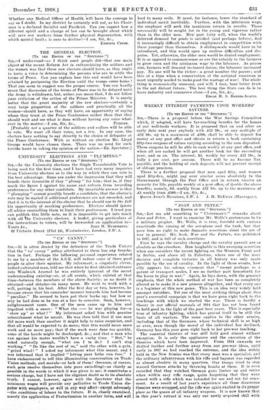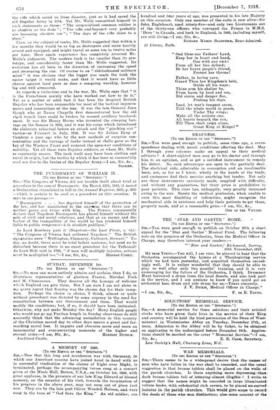" JOAN AND PETER."
[To THE EDITOR OF THE " SPECTATOR."]
Sig,—Let me add something to " Ulsterman's " remarks about Joan and Peter. I want to examine Mr. Wells's pretensions to be a military prophet. Mr. Wells, it is true, foretold with curious exactitude the coming of the aeroplane and the tank, but that gave him no right to make dogmatic assertions about the art of war in general. His book, War and the Future, was published in 1917, and is full of such assertions.
First he says the cavalry charge and the cavalry pursuit are as obsolete as the crossbow. How laughable is this sweeping assertion when one considers the recent fighting on the Western Front and in Serbia, and above all in Palestine, where one of the most
decisive and complete victories in all history was only made possible by the use of cavalry. In the light of these events, how silly appears his solemn comment that " except perhaps as a parent of transport mules, I see no further part henceforth for the horse to play in war." Again, he lays down, with the greatest emphasis, that the whole method of war has been so completely altered as to make it a new process altogether, and that every one is a beginner at this new game. This is an idea very widely held amongst outsiders. Yet one of the most striking things about this year's successful campaign is that we have gone right back to the teachings with which we started the war. There is hardly a theory in our official manuals of 1914 that has not been found to hold good in the light of the past four years. This is especially true of infantry fighting, which has proved itself to be still the basis of all warfare. The same applies to the other armies, including that of the Germans, whose technical skill is as high as ever, even though the moral of the individual has declined. Germany has this year gone right back to her pre-war teaching.
The essential theories of war still hold good almost without
exception. It is only the appliances and the execution of the theories which have been improved. From 1914 onwards we drifted further and further away from our pre-war ideas, until early in 1917 we had reached the extreme, and the idea widely held do the New Armies was that every man was a specialist, and the ordinary infantryman with his rifle and bayonet was regarded as almost obsolete in many quarters. Our troops tried to stop massed German attacks by throwing bombs at them. It is even recorded that they watched German guns limber up and retire when within easy rifle range, quite forgetting that they were armed with a rifle which was intended for use and not for orna- ment. As a result of last year's experience all these disastrous theories were scrapped, and the rifle was again exalted to its proper place as the queen of all infantry weapons. It is now known that in this year's retreat it was only our newly acquired skill with
the-rifle which saved- us from disaster, just as it had saved_ the - old- Regular Army in 1914. Yet Mr. Wells committed- himself to such statements as. these: " The unspeoialised common soldier is as obsolete as the dodo "; " The rifle -and bayonet very probably are becoming obsolete too "; " The days of the- rifle draw to a close."
Then, on the subject of tanks, Mr. Wells suggested that within a few months they would be-as big as. destroyers and more heavily armed and equipped, and might travel at some ten to twelve miles per hour. Here again experience has completely reversed Mr. Wells's judgment. The modern tank is far smaller than its pro- totype, and considerably faster than Mr. Wells suggested. Its evolution has all been - in the direction of increasing the speed and decreasing the size. Of course to an " old-fashioned military mind" it was obvious that the bigger you made the tank the easier target it would make, and that it would have as little chance against land guns as does a sea-going. warship, however big and well armoured.
As regards a victorious end to the war, Mr. Wells says that " it is the Frenchmen mainly who have worked out how to do it." Yet. as a matter of solid fact it has been the despised British Regular who has been responsible for most of the tactical improve- ments and innovations of the war. It was the late-General John Gough who at Neuve Chapelle first demonstrated how the old rigid trench lines could be broken by massed artillery bombard- ment. It was Sir Henry Horne who invented the creeping bar- rage on the Somme in 1916, and it was his corps which introduced the elaborate rehearsal before an attack and the "pinching out " tactics—at Fricourt in July, 1916. It was Sir Julian Byng at Cambrai a year ago who by the new methods of surprise con- centration and the barrage of tanks instead of shells gave us the key of the Western Front and restored the open-war conditions of mobility. Yet all these were Regular soldiers, at whom Mr. Wells so constantly sneers. The tank itself may have been civilian and naval in origin, but the tactics by which it has been so successfully used are due to the brains of the Regular Army.—I am, Sir, &c.,
SOLDIER.











































 Previous page
Previous page